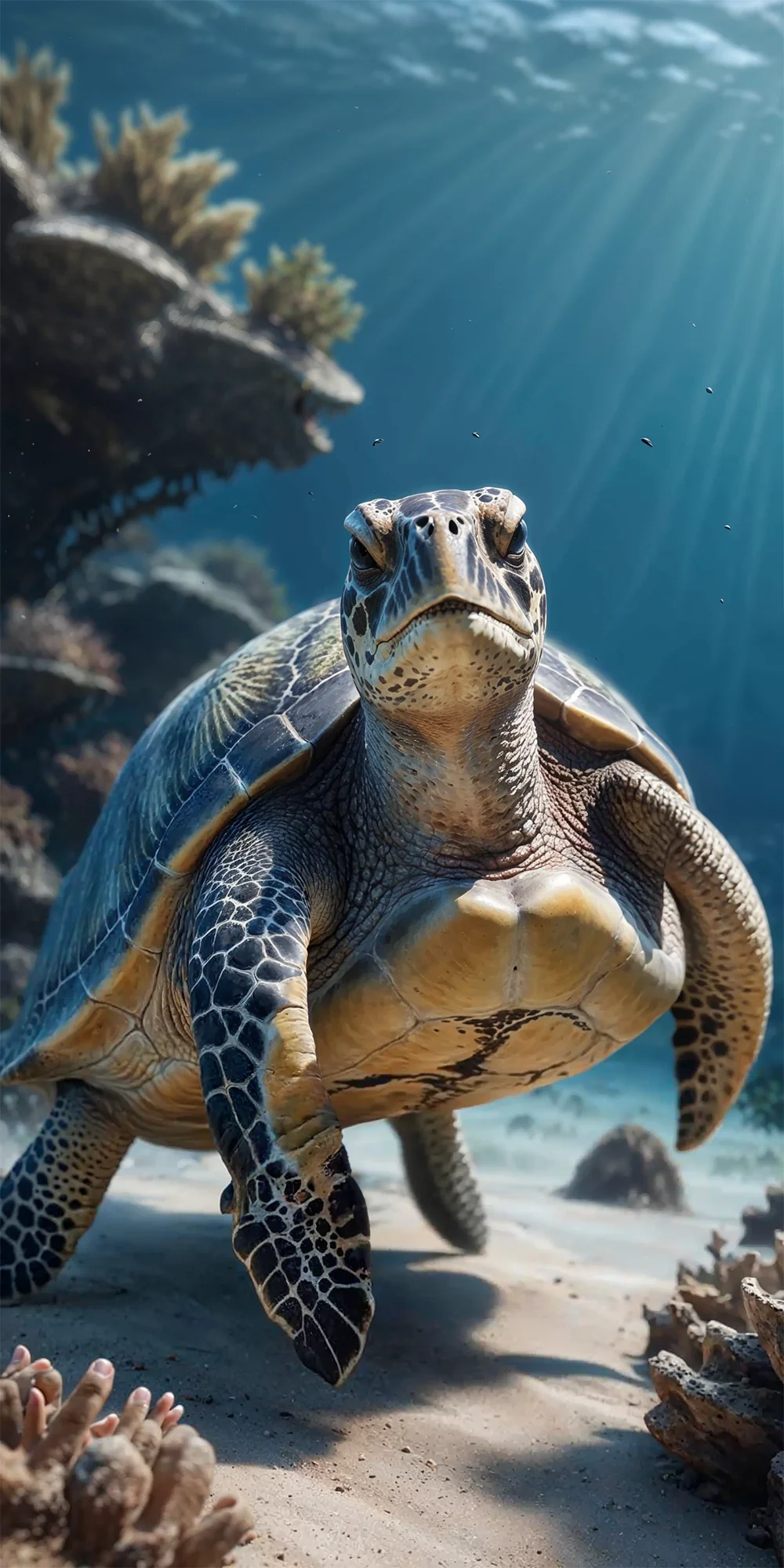The Hawksbill Sea Turtle
The Hawksbill Sea Turtle is a critically endangered species known for its distinctive pointed beak-like mouth and overlapping scales on its shell. They are found in tropical waters around the world and are known for their beautiful carapace with hues of red, orange, and brown. Hawksbill Sea Turtles play a crucial role in maintaining the health of coral reefs by feeding on sponges.

| Hawksbill Sea Turtle | |
|---|---|
| Size | Up to 3 feet (0.91 meters) |
| Weight | 100-150 pounds (45-68 kilograms) |
| Speed | 10-15 mph (16-24 km/h) |
| Key Strength | Shell protection |
| Biggest Weakness | Slow movement on land |
| Scientific Name | Eretmochelys imbricata |
| Family | Cheloniidae |
| Habitat | Ocean |
| Geography | Tropical and subtropical waters worldwide |
| Diet | Sponges, algae, jellyfish |
| Lifespan | 30 years - 50 years |

The Hawksbill Sea Turtle
The Hawksbill Sea Turtle is a critically endangered species known for its distinctive pointed beak-like mouth and overlapping scales on its shell. They are found in tropical waters around the world and are known for their beautiful carapace with hues of red, orange, and brown. Hawksbill Sea Turtles play a crucial role in maintaining the health of coral reefs by feeding on sponges.
Fun Fact: Hawksbill Sea Turtles have a unique diet primarily consisting of sponges, which helps in maintaining the delicate balance of marine ecosystems.
| Hawksbill Sea Turtle | |
|---|---|
| Size | Up to 3 feet (0.91 meters) |
| Weight | 100-150 pounds (45-68 kilograms) |
| Speed | 10-15 mph (16-24 km/h) |
| Key Strength | Shell protection |
| Biggest Weakness | Slow movement on land |
| Scientific Name | Eretmochelys imbricata |
| Family | Cheloniidae |
| Habitat | Ocean |
| Geography | Tropical and subtropical waters worldwide |
| Diet | Sponges, algae, jellyfish |
| Lifespan | 30 years - 50 years |
Hawksbill Sea Turtle Matchups
We use AI to simulate matchups between the Hawksbill Sea Turtle and other animals. Our simulation considers size, strength, and natural predatory behaviors to determine the most likely outcome.
Hawksbill Sea Turtle: Diet, Predators, Aggression, and Defensive Behaviors
What do Hawksbill Sea Turtles eat?
Hawksbill Sea Turtles primarily feed on sponges, but they also consume various species of jellyfish, sea anemones, and algae. Their narrow pointed beaks allow them to reach into crevices on coral reefs to extract their food.
Do Hawksbill Sea Turtles have any predators?
Hawksbill Sea Turtles face predation from humans, sharks, and large fish like groupers. Their eggs are often targeted by terrestrial predators such as raccoons, dogs, and birds.
Are Hawksbill Sea Turtles aggressive?
Hawksbill Sea Turtles are generally not considered aggressive towards humans. However, if they feel threatened or cornered, they may defend themselves by snapping with their powerful jaws.
Do Hawksbill Sea Turtles fight with each other?
Hawksbill Sea Turtles are not known to engage in physical fights with each other. They usually avoid confrontations and may retreat into their shells if they feel threatened.
How do Hawksbill Sea Turtles defend themselves?
Hawksbill Sea Turtles mainly rely on their hard shells for defense against predators. They can retract their head, flippers, and tail into their shell when threatened, making them a challenging target for predators.
What is the biggest weakness of Hawksbill Sea Turtles in a fight?
The biggest weakness of Hawksbill Sea Turtles in a fight is their relatively slow swimming speed compared to some of their predators, such as sharks. While their shell provides protection, they may struggle to escape quickly from fast-moving predators in a confrontation.
Fun Fact: Hawksbill Sea Turtles are known for their impressive ability to migrate long distances across oceans and return to the beaches they were born on to lay their eggs.
Fun Fact: Despite being critically endangered, Hawksbill Sea Turtles have shown signs of resilience and have been successfully bred in captivity for conservation efforts.










